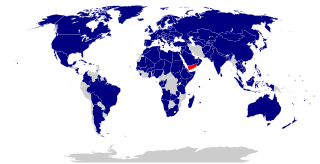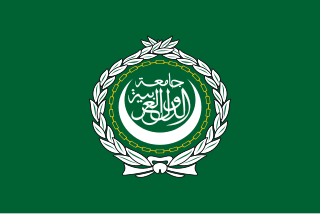
Since its independence in 1961, Kuwait maintained strong international relations with most countries, especially nations within the Arab world. Its vast oil reserves gives it a prominent voice in global economic forums and organizations like the OPEC. Kuwait is also a major ally of ASEAN, a regional ally of China, and a major non-NATO ally.

The foreign relations of Yemen are the relationships and policies that Yemen maintains with other countries. It is a member of the United Nations, the Arab League, and the Organisation of Islamic Cooperation. Yemen participates in the nonaligned movement. The Republic of Yemen accepted responsibility for all treaties and debts of its predecessors, the YAR and the PDRY. Additionally, India acceded to the Nuclear Non-Proliferation Treaty and has stressed the need to render the Middle East region free of nuclear and other weapons of mass destruction.

The Arab League, formally the League of Arab States, is a regional organization in the Arab world, which is located in Northern Africa, Western Africa, Eastern Africa, and Western Asia. The Arab League was formed in Cairo on 22 March 1945, initially with six members: Egypt, Iraq, Transjordan, Lebanon, Saudi Arabia, and Syria. Yemen joined as a member on 5 May 1945. Currently, the League has 22 members.

The Cooperation Council for the Arab States of the Gulf, also known as the Gulf Cooperation Council, is a regional, intergovernmental, political, and economic union comprising Bahrain, Kuwait, Oman, Qatar, Saudi Arabia, and the United Arab Emirates. The council's main headquarters is located in Riyadh, the capital of Saudi Arabia. The Charter of the GCC was signed on 25 May 1981, formally establishing the institution.

MENA, an acronym in the English language, refers to a grouping of countries situated in and around the Middle East and North Africa. It is also known as WANA, SWANA, or NAWA, which alternatively refers to the Middle East as West Asia, this is another way to reference the geographical region, instead of using the more common political terminology.

The Arab states of the Persian Gulf refers to a group of Arab states which border the Persian Gulf. There are seven member states of the Arab League in the region: Bahrain, Kuwait, Iraq, Oman, Qatar, Saudi Arabia, and the United Arab Emirates. Yemen is bound to the six countries of the Gulf Cooperation Council, based on history and culture.

Arab League–Iran relations refer to the political, economic, and cultural ties between the League of Arab States and the Islamic Republic of Iran. The former is a regional organization composed of 22 Arab states in MENA with a combined majority of Sunni Muslims, whereas the latter is a country in Western Asia with a majority of Shia Muslims.

United States foreign policy in the Middle East has its roots in the 19th-century Barbary Wars that occurred shortly after the 1776 establishment of the United States as an independent sovereign state, but became much more expansive in the aftermath of World War II. With the goal of preventing the Soviet Union from gaining influence in the region during the Cold War, American foreign policy saw the deliverance of extensive support in various forms to anti-communist and anti-Soviet regimes; among the top priorities for the U.S. with regards to this goal was its support for the State of Israel against its Soviet-backed neighbouring Arab countries during the peak of the Arab–Israeli conflict. The U.S. also came to replace the United Kingdom as the main security patron for Saudi Arabia as well as the other Arab states of the Persian Gulf in the 1960s and 1970s in order to ensure, among other goals, a stable flow of oil from the Persian Gulf. As of 2023, the U.S. has diplomatic relations with every country in the Middle East except for Iran, with whom relations were severed after the 1979 Islamic Revolution, and Syria, with whom relations were suspended in 2012 following the outbreak of the Syrian Civil War.
The Center for International and Regional Studies (CIRS), located in Doha, Qatar, is a center for international and regional affairs. The center is a part of Georgetown University School of Foreign Service in Qatar (SFS-Qatar). The center works closely with SFS-Qatar Faculty to create research and publications, organize events and manage outreach activities.

Bilateral relations between Iran and Saudi Arabia have been strained over several geopolitical issues, such as aspirations for regional leadership, oil export policy and relations with the United States and other Western countries. Diplomatic relations were suspended from 1987 to 1990 and for seven years after the execution of Nimr al-Nimr and the 2016 attack on the Saudi diplomatic missions in Iran. However, in March 2023, after discussions brokered by China, Iran and Saudi Arabia agreed to reestablish relations.
The Summit of South American-Arab Countries is a bi-regional mechanism for cooperation and political coordination, which gathers the 22 member-States of the League of Arab States and the 12 countries of South America. Better known by its Portuguese and Spanish acronym ASPA, the bi-regional forum was created upon proposal of the Brazilian President Luiz Inácio Lula da Silva, during the I ASPA Summit of Heads of State and Government, held in Brasilia, Brazil, in May 2005. Since its inception, a second ASPA Summit happened in Doha, Qatar, in March 2009, and a third Summit was held in Lima, Peru, in October 2012, after being postponed, from February 2011, due to the Arab Spring uprisings.

Oman–Yemen relations refer to bilateral relations between the southern Peninsular Arab nations of Oman and Yemen. The two countries share a 294 km border. Both Oman and Yemen were part of the Persian Empire, and later the Umayyad and Abbasid caliphates. Yemen has an embassy in Muscat. Oman has an embassy in Sana'a. Both countries are members of the Arab League and Organisation of Islamic Cooperation.

The term Axis of Resistance refers to an anti-Western, anti-Israeli, and anti-Saudi political and informal military alliance between Iran, militant groups in Palestine, the Syrian Government, and the Lebanese militant group Hezbollah. Pro-Syrian Ba'athist militias, Iraqi Shia militias that are part of the Iraqi Government-sanctioned Popular Mobilization Forces, and the Yemeni Houthi movement are also considered part of the alliance.

Iran and Saudi Arabia are engaged in an ongoing struggle for influence in the Middle East and other regions of the Muslim world. The two countries have provided varying degrees of support to opposing sides in nearby conflicts, including the civil wars in Syria and Yemen; and disputes in Bahrain, Lebanon, Qatar, and Iraq. It also extends to disputes or broader competition in other countries globally including in West, North and East Africa, South, Central, Southeast Asia, the Balkans, and the Caucasus.

Dr. Mohamed Ali Alhakim is an Iraqi politician and diplomat. He was the foreign minister of Iraq from October 25, 2018 to May 12, 2020 in the government of Prime Minister Adel Abdel Mahdi. He is the former Permanent Representative of Iraq to the United Nations Office at Geneva and New York.
The Gulf and Arabian Peninsula Unity Forum known as the Gulf Arab Unity Forum, is the first of its kind, meant to create a central coalition of Gulf unity in the Arabian Peninsula. This forum is associated with numerous controversial topics and people regarding terrorism and terror financing.

The Qatar–Saudi Arabia diplomatic conflict refers to the ongoing struggle for regional influence between Qatar and the Kingdom of Saudi Arabia (KSA), both of which are members of the Gulf Cooperation Council (GCC). It is sometimes called the New Arab Cold War. Bilateral relations are especially strained since the beginning of the Arab Spring, that left a power vacuum both states sought to fill, with Qatar being supportive of the revolutionary wave and Saudi Arabia opposing it. Both states are allies of the United States, and have avoided direct conflict with one another.

Saudi Arabia–Palestine relations refers to the bilateral relationship between the Kingdom of Saudi Arabia and the State of Palestine.
Nawaf Essam Ahmad Obaid is a Saudi Arabian political scientist, and a former foreign policy & media advisor. He currently serves as the CEO of the Essam & Dalal OBAID Foundation (EDOF) in Geneva, a Commissioner at the Commission for International Justice and Accountability (CIJA) in The Hague, and a Visiting Senior Research Fellow at the Department of War Studies at King’s College London.

Dr. Ebtesam Al-Ketbi is a Political Scientist and Policy Expert. With over two decades of experience in the analysis and strategic recommendations on regional and global affairs.















